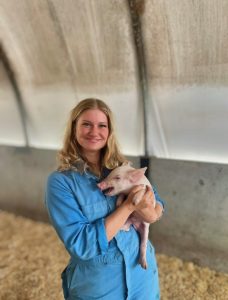Reported by: stockhead.com.au

Vets are four times likely to die of suicide. Australia’s largest regional vet network Apiam Animal Health is determined to do its part in putting an end to the mental health and suicide crisis gripping the sector.
As it continues to build its market as Australia’s largest rural and regional animal veterinary provider, Apiam Animal Health (ASX:AHX) is also becoming a leader in improving the welfare of its veterinarians.
In what has been described as mental health crisis facing the sector, vets are four times more likely to die of suicide than the general population and two times more likely than any other healthcare profession.
However, it’s a grim statistic Apiam managing director Dr Chris Richards is committed to changing through a broad mental health and wellness strategy to ensure its 200+ veterinarians along with support staff are given vital care and assistance.
“Mental health is sadly a major concern in the veterinary sector and a key focus for us is to become the market leader in this space and prioritise the welfare of our team,” Richards told Stockhead.
Apiam implements broad mental health strategy
Apiam General Manager, People, Renee Waters said the company has more than 50 trained mental health first aid officers supporting all its 62 different locations.
It has an employee assistance program whereby staff and their immediate family have access to counselling sessions with a qualified psychologist or social worker.
“It’s important for our staff to have access to a confidential service that supports their wellbeing at no cost to them,” Waters said.
“We’ve tried to make access to counselling services as convenient as possible through not just the traditional face-to-face sessions but also by phone or online.”
Apiam also has an additional paid-leave reward day to support mental wellbeing and has joined forces with Smiling Mind, a not-for-profit web and app-based program developed by psychologists and educators to help promote mindfulness.
“The important aspect of Smiling Mind is it’s a preventative approach to managing mental wellbeing rather than responding reactively to the problem,” said Waters.
“Our mental health first aid officers have recently formed a Mental Health Committee and have become proactive at developing further wellness initiatives.”
One of the company’s major initiatives to conquer the exhaustion of rural vets, who are often on call 24/7, is the implementation of Apiam’s proprietary software-based triage service.
The service is run by experienced nurses who manage after hours calls to determine if an animal needs to be seen immediately or can be scheduled for an appointment during normal business hours.
“It is reducing the number of calls going to vets after hours by up to 60% which means when a vet gets a call, it’s an actual animal emergency that they can provide their full attention,” Richards said.
“It takes away the calls at say, midnight, for non-urgent matters which can be addressed by a nurse or can be seen in the morning which helps promote a better work-life balance for our vets.”
Caring for farmers also a key Apiam priority
But it’s not just veterinarians Apiam is working to help. The company has implemented a Client Assistance Program or CAP to aid their clients, many of whom are farmers. Under the program clients can have up to five individual sessions with a trained psychologist or social worker.
“Tragedies may happen on farms whether it’s fires, floods, drought, accidents or injuries to people or livestock and it all adds pressure on farmers who sadly are also disproportionately affected by mental health issues,” Richards said.
“Our vets spend a lot of time with their farming clients whether it’s on their properties or in the community as part of the local sporting club or being in the fire brigade with them, so can be first to realise when they need support too.”
Happy, healthy staff will always be an Apiam priority
Richards recognises that well-being of the Apiam team contributes to success of the business as a whole so is more than prepared to continue prioritising mental health among staff.
“If you have a happy, healthy and engaged team and you genuinely care about their welfare then the bottom line will take care of itself.” Richards said.
Since we’ve been highlighting these initiatives to industry, we’re attracting really good experienced vets coming to us knowing they will have the extra needed support.”









